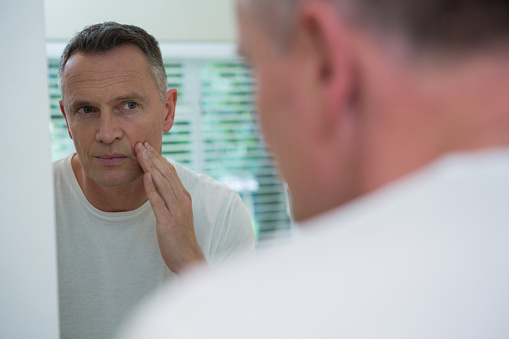Oral Cancer and Drinking It's been established that smoking raises the risk of oral cancer; however, heavy drinkers who also smoke have an even higher risk of developing the disease. Scientists now think that the combined effects of these chemicals are even more severe than previously thought. It's been established that smoking raises the risk of oral cancer; however, heavy drinkers who also smoke have an even higher risk of developing the disease. Scientists now think that the combined effects of these chemicals are even more severe than previously thought.How alcohol interacts with tobacco to raise cancer risk may be best understood in terms of how it affects the mouth. Heavy drinking can lead to nutritional deficiencies, which in turn can reduce the body's natural ability to use antioxidants to prevent cancer formation. This is because alcohol dehydrates cell walls, making it easier for tobacco carcinogens to permeate mouth tissues. Both intracellular and extracellular pathways may be used by alcohol to affect the proliferative cells. These pathways may control how carcinogenic substances interact with basal layer stem cells during their proliferation. At Surf City Oral and Maxillofacial Surgery, we try to provide assistance to those who are suffering from oral cancer. If you take Our surgeons's advice, it can help you beat cancer successfully. Alcohol’s Side Effects on the BodyThe following are the effects of alcohol on the body:
People who consume large amounts of alcohol often skip meals. Oral cancer risk factors include unhealthy eating habits. How Does Alcohol Consumption Elevate Danger of Developing Cancer?Alcohol consumption raises cancer risk in different ways. Alcoholic beverages contain ethanol, which decomposes into acetaldehyde, a carcinogenic substance. This substance is toxic to DNA and prevents your cells from fixing the damage. In some cases, this can promote the growth of cancer cells. Some hormone levels, including estrogen, can be altered by alcohol consumption. Hormones play the role of messengers, instructing cells to multiply. The more frequently cells divide, the higher the risk that something may go wrong, leading to cancer. Alcohol consumption impairs the absorption and breakdown of Vitamins A, C, D, and E. The body is better able to stave off cancer thanks to these nutrients. The dental specialists at Surf City Oral and Maxillofacial Surgery can suggest helpful steps to rectify the situation. The calories in alcoholic beverages are considered empty calories. Gaining weight, which can be caused by eating too many calories, has increased the risk of developing cancer. What Can You Do to Prevent Oral Cancer?
Cancer Patients Who Drink Alcohol During and After TreatmentConsumption of alcoholic beverages has been linked to an increased danger of acquiring several types of cancer. Alcohol consumption may increase the likelihood of a recurrence. It has been shown to raise estrogen levels, which has been linked to an increased risk of breast cancer recurrence. Higher alcohol consumption may also increase cancer risk in persons who have already been diagnosed with cancer. It is really important to refrain from drinking alcohol when undergoing cancer treatment. Alcohol, even in negligible doses, can aggravate mouth sores brought on by several cancer treatments. Some medications used to treat cancer can interact negatively with alcohol, possibly increasing the likelihood of side effects. Call Surf City Oral and Maxillofacial Surgery at 657-384-2787 to schedule an appointment. |